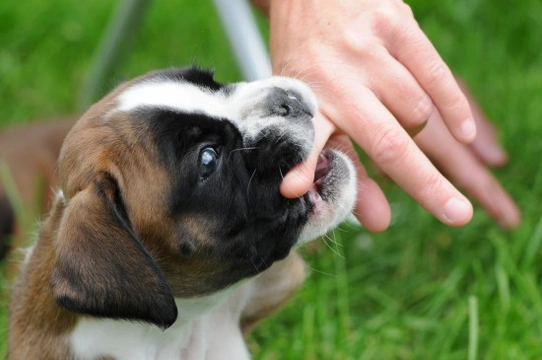
Puppies and the nipping stage of development
Puppies are very mouthy animals, and love to get their teeth into all sorts of things! As well as using their mouths to gain experience of the world around them and learn about different textures and tastes, puppies also need plenty of things to chew on to help with teething and to help their adult teeth break through the gums.
All puppies also go through a nipping stage, before they learn about what is known as bite inhibition, and that biting and nipping is not viewed positively by people and other dogs, and will elicit a negative reaction. For the dog owner that finds themselves the owner of a puppy for the first time, finding this out can be unexpected and worrying, and many first time dog owners become concerned that this is an indication of a behavioural problem or a propensity to aggression, when in fact this is not the case.
While you should be sure to indicate to your puppy of any age that nipping is not good, and this is usually as simple as responding to a nip by saying “no” firmly or even yelping, learning to understand the nipping stage and when it might end can help you to gain a better understanding of your pup. Read on to learn more about puppies and the nipping stage of their development.
Biting and nipping and its origins from birth
When puppies are born, they are blind, and have a very limited range of senses available to then in order to navigate the world around them. As newborns, the drive and goal of all puppies is to feed, and this means finding the dam’s teats and latching on in order to receive milk. Puppies during their first couple of weeks of life will nip and mouth at their surroundings in their search for the dam and their nourishment, and then as they become a little older, they begin to learn about play and social interaction by nipping and grappling with the other puppies in the litter with them. This is part of the learning and bonding process, and as a phase, is one that usually ends naturally as puppies begin to learn from experience that nipping elicits a negative reaction from their peers, and that they do not like being nipped themselves!
When does the nipping stage end?
By the time puppies are weaned from the mother, they will have begun to learn about bite inhibition and not to nip so frequently. However, when the pups reach around four to six months old, they will begin chewing and potentially nipping again in earnest, as part of the teething process while they lose their baby teeth. Many new puppy owners mistakenly view this stage as a setback, and a problem with their pups, rather than as a natural progression as part of their development. However, this is a natural part of teething, and your pup should have access to plenty of chew toys in order to ease the pressure of their new teeth breaking through the gums.
Training your puppy not to nip
When they grow older and reach around nine months of age, puppies no longer need to chew and mouth so vigorously as they have all of their adult teeth, and this is the pinch point at which nipping should be discouraged, in order to prevent it becoming a ingrained habit in the adult dog.
Talking to your puppy in a language that they are familiar with and can understand is the fastest and most effective way to train your puppy out of nipping, and this means responding to nips and bites in a way that your puppy is immediately familiar with. Puppies know that when they are nipped, it hurts, and they yelp; and when they nipped their littermates, they received the same response. Taking on an offended expression and “yelping” yourself is a clear and unambiguous way to transmit the message to your puppy that nipping is not ok.
While your dog is young, they will also still be learning about boundaries and their own strength, and how much pressure they can apply with their teeth before it causes pain or elicits a negative reaction. Expect a process of trial and error with your puppy until they get the hang of how much tooth is too much!
Provide plenty of chew toys for your puppy or dog of any age in order to divert their attention and give them something to do with their teeth. Also, remain consistent in your training with your puppy; do not allow nipping as part of a game sometimes because it is entertaining to you or not painful, as this will convey a mixed message to your puppy.
End your game if your puppy nips, and do not recommence play until they have calmed down. At this age of development when your puppy is still learning self control and appropriate behaviour, do not engage in play that may exacerbate the nipping instinct or cause your puppy to get carried away, such as games of tug of war, or anything that involves you trying to snatch a toy away from your puppy.



